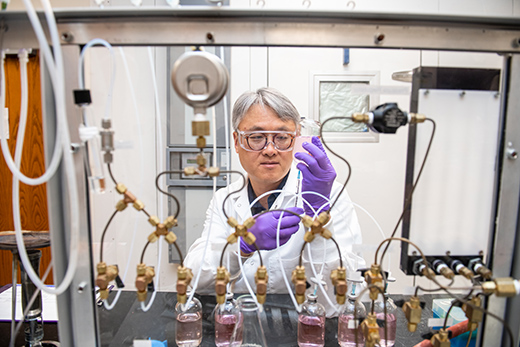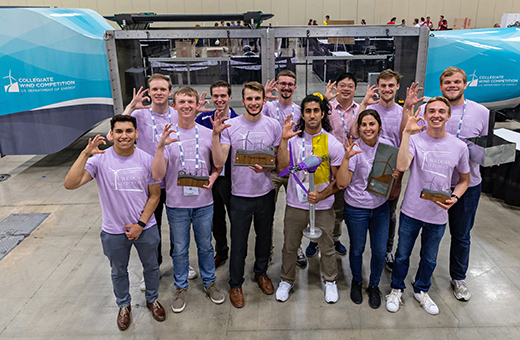Kansas State University's Wildcat Wind Power team won for the first time in club history at the 2022 Collegiate Wind Competition, a U.S. Department of Energy event in San Antonio May 16-18.
The K-State team battled 11 other schools to claim the top prize in the yearlong national competition. The team designed, built and tested its model wind turbines throughout the academic year before presenting and testing the models in a wind tunnel at the event, which was in conjunction with the American Clean Power Association's CLEANPOWER 2022 conference and exhibition.
Hongyu Wu, faculty advisor for Wildcat Wind Power, was pleased to see the team's hard work pay off.
"I am so proud of our team's effort in this competition," Wu said. "The chief judge was very complimentary of the team's performance, saying the turbine testing performance was the best he had seen since the inception of the DOE Collegiate Wind Competition."
The competition is divided into four contests that test the skills of the team on its ability to create a viable model, along with rating the team's design and presentation skills, its ability to design an offshore wind farm and its effectiveness in wind-related outreach.
K-State placed in the top half of each contest, winning in turbine testing, taking second in turbine prototype, fourth in connection creation and fifth in project development to finish with the highest overall score.
"We developed the turbine early in the fall semester and continued design and testing right up until we left for San Antonio," said Hayden Dillavou, vice president of the club. "We have our own wind tunnel and workspace in the basement of the engineering building, where we do most of our testing and design work."
Dillavou said the club is made up primarily of mechanical and electrical engineering students but welcomes members from all majors and backgrounds, including those outside the Carl R. Ice College of Engineering.
The following students are members of Wildcat Wind Power:
Matthew Monsion, May 2022 graduate in electrical engineering, Conway Springs; Andrew Dulac, May 2022 graduate in computer engineering, Derby.
From Greater Kansas City: Chase Eccles, junior in mechanical engineering, Gardner; Kent Deterding, sophomore in electrical engineering, Kansas City; Israel Barraza, sophomore in civil engineering, Michael Brosseit, senior in electrical engineering, Jakob Long, junior in construction science and management, Kavian Kalantari, senior in mechanical engineering, and Tyler Schooley, May 2022 graduate in electrical engineering, all from Olathe; Eric Christman, May 2022 graduate in mechanical engineering and Spanish, and Hayden Dillavou, May 2022 graduate in electrical engineering, both from Overland Park; Andy Freshnock, senior in computer engineering, Prairie Village; Josh Meurer, senior in mechanical engineering, Shawnee.
Rafael Lopez Barraza, senior in mechanical engineering, Liberal; David Pierson, junior in electrical engineering, Sabetha; and Patrick Flett, May 2022 graduate in electrical engineering, Wichita.
From out of state: Jacob Lowe, junior in mechanical engineering, Firestone, Colorado; Macie Sexten, sophomore in electrical engineering, Columbia, Missouri; Brianna Wagoner, senior in electrical engineering, Kansas City, Missouri; and Wesley Smith, senior in mechanical engineering, Allen, Texas.
K-State Current
K-State Current - June 1, 2022
K-State Current is a weekly news update for the Kansas Board of Regents to apprise the Regents on a few of the many successes and achievements made by K-State faculty, staff, and students.

K-State News
K-State Salina again selected to support national UAS prize competition
 K-State Salina was selected to support an unmanned aircraft prize competition organized by the National Institute of Standards and Technology for a second consecutive year. Drone-enthusiast contestants can win up to $685,000 in prize money.
K-State Salina was selected to support an unmanned aircraft prize competition organized by the National Institute of Standards and Technology for a second consecutive year. Drone-enthusiast contestants can win up to $685,000 in prize money.
Following its successful coordination of the recent First Responder Unmanned Aircraft System Triple Challenge, Kansas State University Salina Aerospace and Technology Campus has again been selected to lead an unmanned aircraft systems competition that will award prize money to winners.
In partnership with Capital Consulting Corporation, K-State Salina will coordinate the National Institute of Standards and Technology First Responder UAS Indoor Challenge, with plans to hold the live part of the competition in Salina in spring 2023.
This challenge, which will award up to $685,000 in prizes, asks participants to develop a low-cost unmanned aircraft systems platform for first responders that offers improved usability — or flyability — when operated indoors with limited or no GPS signal.
This past year, K-State partnered with the National Institute of Standards and Technology, a part of the U.S. Department of Commerce, for the UAS Triple Challenge, in which participants used their ingenuity to improve search and rescue efforts, support delivery of broadband data in a degraded cellular area, and identify cybersecurity threats and countermeasures on a UAS.
The new indoor competition will ask participants to build and fly a UAS that helps search-and-rescue teams locate missing persons and obstacles indoors. Search-and-rescue operations in an indoor, constrained environment, such as a partial building collapse, require reliable tools to assess the risks to first responders and other search-and-rescue resources. Certain scenarios can be life-threatening if humans are sent in first, so the National Institute of Standards and Technology seeks UAS solutions that provide safe and valuable intelligence while being highly durable and easy to control.
Prize recipients will be determined by a panel of judges, assisted by a team of subject matter experts, throughout each stage of the competition.
Kurt Carraway, executive director of Kansas State University's Applied Aviation Research Center, is interested in seeing contestants' resourcefulness when flying UAS indoors.
"Most UAS utilized today rely heavily on GPS technology," Carraway said. "Indoor environments often lack a GPS signal, significantly hindering UAS systems is a challenge for the many public safety applications."
All UAS enthusiasts are encouraged to compete in the competition. Proposal submissions close at 11:59 p.m. EDT on July 15. For more information on the competition and to register, visit firstresponderuaschallenge.org/uas4.
"We are excited to partner with both the National Institute of Standards and Technology and Capital Consulting and hope this challenge yields cost-effective, meaningful alternatives to improve public safety around the world," Carraway said.
The National Institute of Standards and Technology promotes U.S. innovation and industrial competitiveness by advancing measurement science, standards and technology in ways that enhance economic security and improve our quality of life.
K-State's Aerospace and Technology Campus is home to the university's unmanned aircraft systems program, which is a national leader in the unmanned aviation field and provides many engagement and education opportunities. Learn more at salina.k-state.edu.
For more information about the competition, contact Heather Wagoner at K-State Salina, 785-826-2917, hwagoner@k-state.edu.
K-State Faculty Highlights
Im receives NSF CAREER award for quantifying nitrous oxide emissions in forage conservations
 Jeongdae Im, Jeffrey and Joy Lessman Keystone research scholar and assistant professor in civil engineering at Kansas State University, works in his lab on the K-State campus. His recent CAREER award from NSF involves quantifying nitrous oxide emissions from forage conservations.
Jeongdae Im, Jeffrey and Joy Lessman Keystone research scholar and assistant professor in civil engineering at Kansas State University, works in his lab on the K-State campus. His recent CAREER award from NSF involves quantifying nitrous oxide emissions from forage conservations.
A Kansas State University professor seeks to better understand and quantify emissions of nitrous oxide, a potent greenhouse gas, from agricultural forage conservation with a more than $600,000 Faculty Early Career Development, or CAREER, award from the National Science Foundation.
Jeongdae Im, Jeffrey and Joy Lessman Keystone research scholar and assistant professor of civil engineering in the Carl R. Ice College of Engineering, is investigating the nitrous oxide emissions from forage conservation, which is the practice of stockpiling plants or parts of plants that serve as food for livestock. This process often relies on fermentation, as the lactic acid produced works as a natural preservative for forage crops. But microorganisms that produce greenhouse gases also thrive in this environment.
The project, "CAREER Mechanisms and control of nitrous oxide emissions from forage conservation," aims to provide a understanding of the conserved forage biome and open up a new avenue toward eco-friendly forage management and a sustainable cattle industry.
"Current nitrous oxide emission inventories from agriculture only track emissions from soil management, manure management and field burning of agricultural residues," Im said. "This project will focus on nitrous oxide emissions from forage conservations as an abundant and yet unaccounted source of this greenhouse gas from agriculture and farming."
Im will carry out an integrated laboratory and field research program to quantify nitrous oxide emissions in forage conservations while also investigating the microbial processes that control such emissions. His prior research has already identified a potential solution to this issue which reduces nitrous oxide emissions by 95%. Im has filed a provisional patent and is collaborating with Corteva AgriScience to develop a novel inoculant.
"The outcome of this research will also address one of NSF's 14 grand challenges for engineering in the 21st century, in this case, managing the nitrogen cycle," Im said. "It should accelerate our ability to design and implement safe, effective and sustainable agricultural resource management strategies going forward."
K-State Student News
Wildcat Wind Power notches first-ever win at DOE's Collegiate Wind Competition
 Members of the Wildcat Wind Power team at the 2022 Collegiate Wind Competition pose with their awards after taking first place overall. From left: Israel Barraza, Michael Brosseit, David Pierson, Jakob Long, Hayden Dillavou, Andrew Dulac, Kavian Kalantari, faculty advisor Hongyu Wu, Brianna Wagoner, Matthew Monsion, Eric Christman and Josh Meurer.
Members of the Wildcat Wind Power team at the 2022 Collegiate Wind Competition pose with their awards after taking first place overall. From left: Israel Barraza, Michael Brosseit, David Pierson, Jakob Long, Hayden Dillavou, Andrew Dulac, Kavian Kalantari, faculty advisor Hongyu Wu, Brianna Wagoner, Matthew Monsion, Eric Christman and Josh Meurer.
Steel Bridge team earns trip to national competition
 The K-State Steel Bridge team at the American Society of Civil Engineers Mid-America Student Symposium regional competition in April.
The K-State Steel Bridge team at the American Society of Civil Engineers Mid-America Student Symposium regional competition in April.
The Kansas State University Steel Bridge team from the Carl R. Ice College of Engineering will compete at the American Institute of Steel Construction National Steel Bridge Competition May 27-28 at Virginia Tech in Blacksburg, Virginia.
The team took second place in the American Society of Civil Engineers Mid-America Student Symposium regional competition in April. The event challenged participants to create a one-tenth scale steel bridge of approximately 20 feet in length.
The process includes designing and fabricating a bridge to support 2,500 pounds of steel. In competitions, judges look at how the team minimized the bridge's weight and vertical deflection, as well as the time it takes to build the bridge with steel parts. Each part must fit in a box with dimensions of 4 inches by 6 inches by 4 feet.
"This competition provides a real-world experience for students to consider multiple solutions and decide on the best solution for the client," said Scott Schiff, faculty advisor and teaching professor of civil engineering. "Students gain valuable experience functioning as a team and using knowledge from their undergraduate classes."
"I'm very proud of what our team has accomplished this year," said Kurtis Wicka, senior in civil engineering and captain of the team. "Our multidisciplinary team was able to combine our knowledge of civil, architectural and mechanical engineering to create a bridge that ranks among the top engineering schools in the nation."
Members of the Steel Bridge team who will travel to Blacksburg include the following students:
Koby Hesse, junior in civil engineering, Greeley; and Austin Deters, May 2022 graduate in civil engineering, Seneca.
From out of state: Kurtis Wicka, senior in civil engineering, Paso Robles, California; Reese Perrine, senior in civil engineering, Springfield, Illinois; Johan Rogers, junior in civil engineering, Frederick, Maryland; and Cameron Hicks, senior in architectural engineering, Lee's Summit, Missouri.